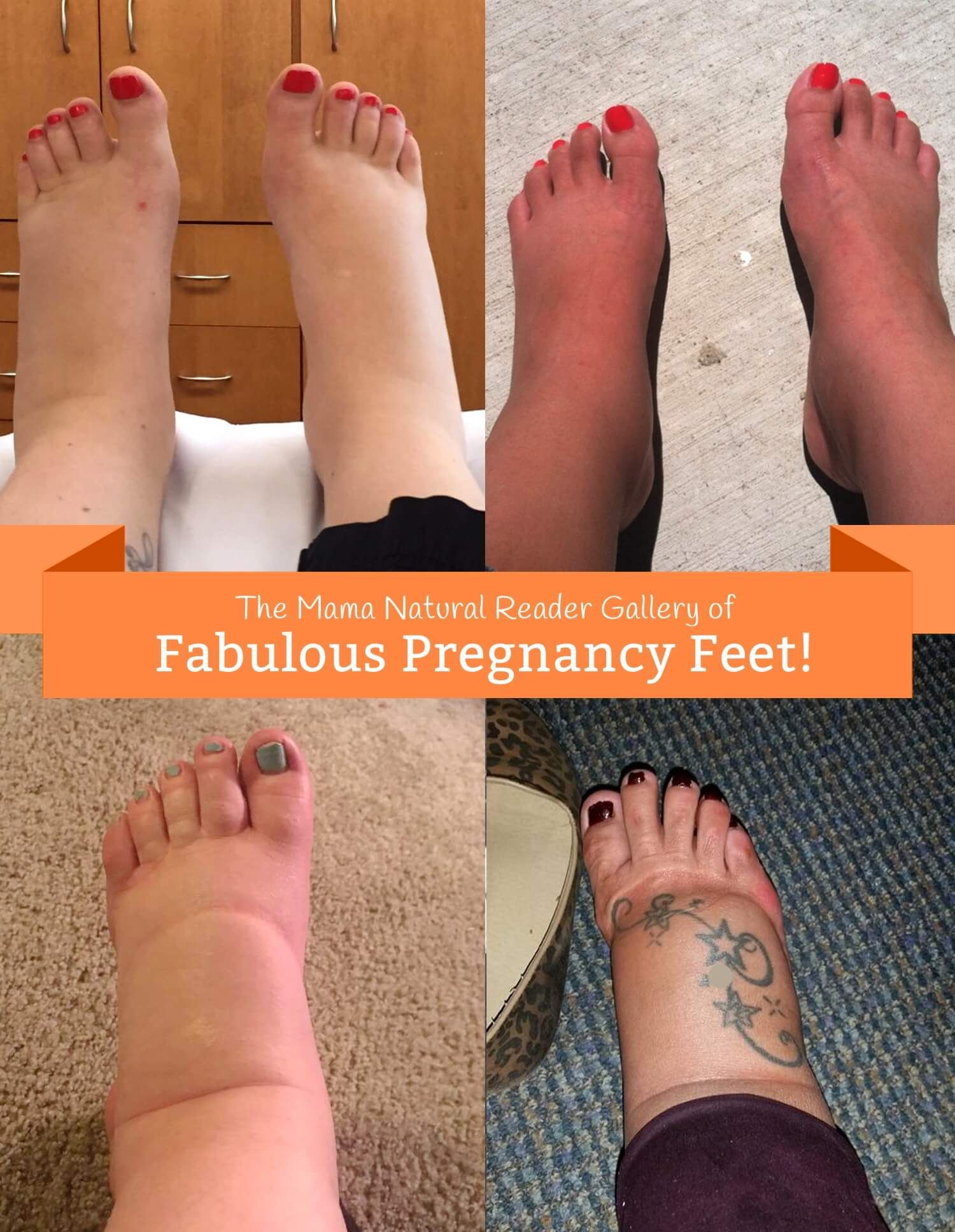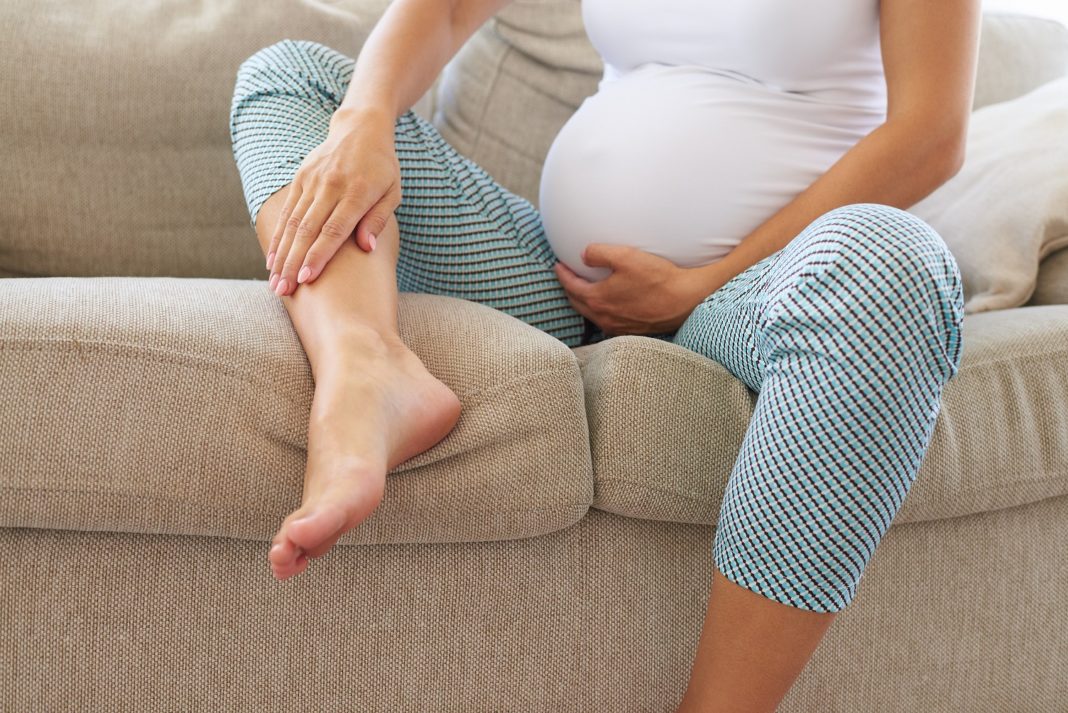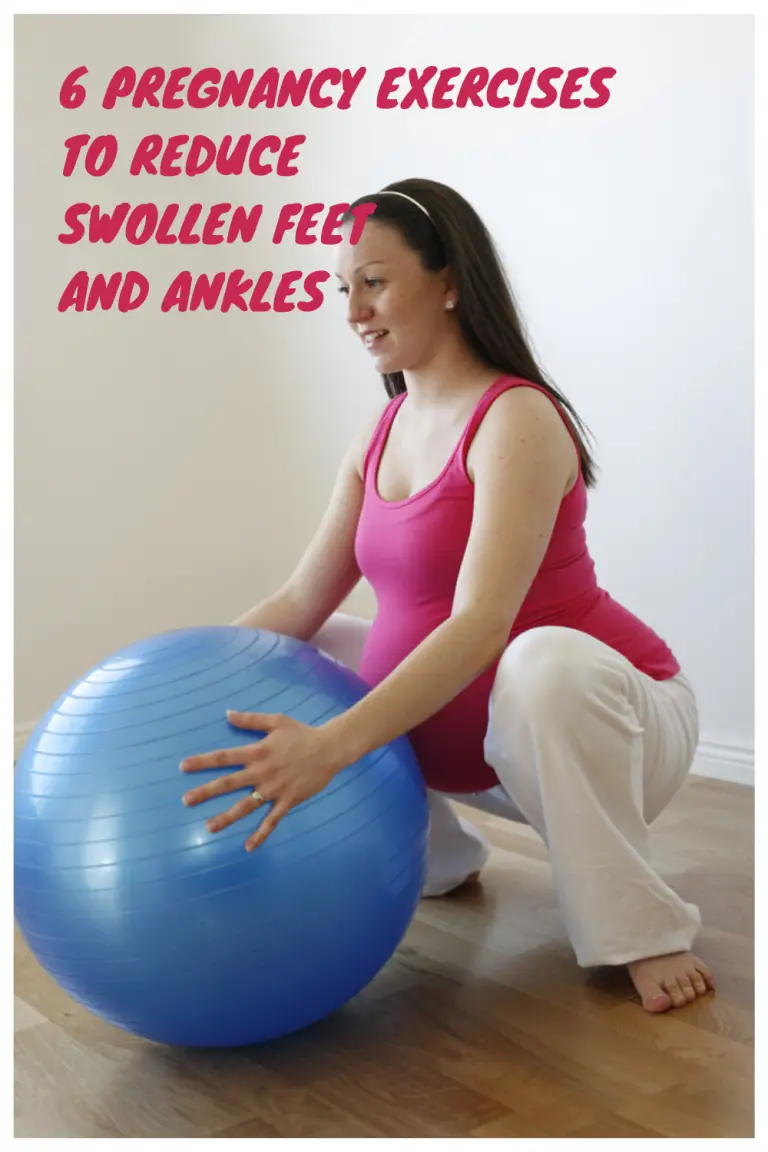Home Remedies For Swollen Feet
If you notice swelling coming on quickly, if these simple remedies dont work, or if your swelling is accompanied by headaches or blurry vision, seek immediate medical attentionthese things can all be symptoms of high blood pressure or preeclampsia.
Here are some different things you can try to reduce swelling while youre pregnant:
Why Does Leg Swelling Occur During Pregnancy
One of the main causes of leg and foot edema during pregnancy is a growing uterus.
As the baby increases in size, this organ puts pressure on the pelvic veins and the inferior vena cava. This produces a slowdown in the return of blood from the lower limbs to the heart and favors the accumulation of fluid in the subcutaneous tissues.
The swelling that usually appears during the third trimester of pregnancy is called physiological edema.
In addition to the gravid uterus, there are other factors that are linked to lower limb edema and are the following:
- Insufficient fluid intake
- Staying in a standing position for long hours
- Excess caffeine
- Dietary imbalances
Leg swelling in pregnant women can cause various discomforts, such as pain, stiff ankles, or difficulty walking.
You may be interested: The 10 Strangest Symptoms of Pregnancy
Keep Your Blood Flowing
Regular and simple exercise like swimming and walking can help with fluid retention. Standing in water for 20 minutes will decrease swelling.
Ditch your heels for now and wear comfortable shoes, and dont stand on your feet for long periods of time without moving. Use orthotic inserts in your shoes to reduce leg and lower back pain, and avoid crossing your legs while pregnant as it restricts blood flow.
Other tips include sleeping on your left side to encourage blood to return to the heart, and elevating your legs whenever possible. Swelling gets worse at the end of the day so take a few minutes out of your busy schedule to put some pillows under your legs and relax. You deserve it.
Read Also: Side Effects Of Donating Plasma While Pregnant
Helpful Ways To Reduce Swollen Feet And Ankles
Walk it Out. Walking during pregnancy is not only great for your overall health, but it keeps your blood flowing and decreases the severity of swelling in the body. Set aside 15-30 minutes a day and take part in a low-intensity stroll throughout your neighborhood to get started.
Get Plenty Of Protein Adequate Salt And Other Essential Nutrients

Pregnant women can be carrying an additional 20 lbs of fluid in the third trimester. Swelling is a common and natural result of this increased fluid. Essential nutrients and minerals directly aeffect how well your body is able to process all that extra fluid, also known as electrolyte balance.
Avoid processed and packaged foods, which contain high amounts of regular table salt, and opt for whole foods and unprocessed sea salt that contains all the good-for-you trace minerals and nutrients that will help maintain optimal electrolyte balance and reduce or prevent swelling. For more information on pregnancy nutrition, read our article on Healthy eating during pregnancy.
Also Check: Getting Braces While Pregnant
Take An Epsom Salt Bath
Anecdotal evidence suggests that Epsom salts, also known as magnesium sulfate, draw out toxins from the body and reduce inflammation, but there isn’t much scientific evidence to support those claims. However, taking an Epsom salt bath may still provide some relief. “Soaking in this type of bath may also help relieve muscle tension in your legs,” says Dr. Winiarz. He recommends bathing for about 15 minutes.
Be sure to keep your bath at 100°F or below to avoid raising your body temperature, particularly in the first trimester.
Go Easy On The Caffeine
To help combat swollen feet, even more, replace your morning cup of coffee with some chamomile or peppermint tea. Caffeine is a diuretic, which means it increases how often you use the bathroom. When youre pregnant, this can easily lead to dehydration and fluid retention. Both chamomile and peppermint tea also have many beneficial trace mineralsincluding potassium.
Read Also: Risks Of Donating Plasma While Pregnant
Causes Of Swollen Feet During Pregnancy
Swelling in some areas of the body is normal and common for most people during pregnancy. It develops for several reasons, including changes in hormones, blood volume, fluid, and circulation.
Increases in the hormone progesterone during pregnancy slow down digestion and circulation. The changes in digestion lead to more fluid being absorbed by the large intestine, which increases fluid volume. Progesterone also slows down circulation and relaxes blood vessels, making it easier for fluid to build up in the feet.
In addition to hormonal changes, there is just more fluid and blood in the body as pregnancy progresses. The pregnant persons blood volume increases about 45% or 1.21.6 liters during pregnancy.
The increased blood helps support a healthy pregnancy and fetal growth and prepares the body for labor. But it also means there is more fluid to build up in the feet.
Swelling in the feet may also be worse when:
- The weather is hot or humid.
- You spend long hours standing.
- You wear tight clothing, jewelry, or shoes.
Donât Miss: Vagisil Safe While Pregnant
Preeclampsia A Dangerous Cause Of Swollen Ankles
Preeclampsia is a complication of pregnancy thats characterized by an increase in the pregnant womans blood pressure, among other issues. Although the initial symptoms of such a condition are subtle, its potentially serious for the mother and the baby.
One of the first manifestations of preeclampsia is sudden swelling of the ankles or feet. Therefore, when edema appears, you need to consult a physician as soon as possible.
As the condition progresses, other manifestations begin to appear and should be attended to immediately:
- Severe headache
- Sudden worsening of swelling of the hands, feet, or face
- Problems with vision
- Stabbing pain below the rib region
While the above symptoms are highly suggestive of preeclampsia, sudden swelling of the legs or ankles may also have to do with other causes. For example, when it appears suddenly and on only one side of the body, it could be a sign of deep vein thrombosis.
Don’t Miss: Can I Donate Plasma While Breastfeeding
Do Light Exercises And Stretches
Regular exercise such as walking, yoga, and swimming allows your leg muscles to contract and helps release pressure from the veins. This in turn improves blood circulation and reduces swelling in the feet.
Moreover, light stretches and bends can help fluid drainage in the legs and provide relief from the discomfort of swollen feet. Therefore, make sure to indulge in some light exercises and stretches regularly to keep the blood flowing and avoid your feet from swelling up.
When To See Your Healthcare Provider
If you notice any swelling or any of the symptoms listed above, see your healthcare provider, who will assess what might be causing the swelling. In some cases, your provider might prescribe a diuretic, a medication that helps expel the excess fluid.
If you also experience difficulty breathing, shortness of breath, or chest pain, see your provider as soon as possible. These might be signs of pulmonary edema , which needs to be treated immediately.
If your hands or face swell suddenly during your pregnancy, notify your healthcare provider immediately. Swelling in the hands or face could be one of the signs of preeclampsia, a blood pressure disorder.
You May Like: Accidentally Donated Blood While Pregnant
Home Remedies For Swollen Feet During Pregnancy
Fix #3
It may seem counterintuitive, but walking is a great remedy for swollen legs and ankles during pregnancy! Exercise helps reduce swelling all over, and even brief walks can do this.
Another of my favorite exercises to do to help reduce swelling throughout the lower body:
The Legs-Up-The-Wall yoga pose. Of course, for pregnancy it needs to be modified. Here is a YouTube video that demonstrates this:
I swear by this pose to reduce swelling in my feet, ankles, and legs. Furthermore, I think that it has helped me avoid spider veins as well which can pop up during pregnancy.
Also, soaking your feet in cool water is another option for feet and ankles.
What You Can Do

Swollen feet shouldn’t be a cause for concern. They often go away within a few weeks of giving birth.
Until then, you can try these solutions for relief:
Take it easy. Swelling can get worse when you spend long amounts of time standing and walking. Rest often, and elevate your feet.
Gentle massage strokes toward your heart are another way to soothe your feet and move fluid away from them. A cool Epsom salts soak can ease pain that can come from the swelling.
Try this yoga pose. Place your raised legs against a wall as you lie on your back, or your left side. The large vein that brings blood from your lower body to your heart wonât have the weight of your uterus on it.
Use compression socks. These stop fluid from building up. You should start with ones with light compression and put them on when you wake up. These are different from other socks or pant bottoms that are too tight around your ankles and calves and block blood flow.
Move around a little. Light exercise, like multiple short walks throughout the day, or simply flexing your foot can help prevent swelling that can happen when you stay in one position for too long.
Time in the pool may be beneficial, too. As you walk in a pool, your muscles help move fluid out of tissues. You should talk to your doctor before you begin any exercise routine.
Hydrate. Eight to 10 glasses of water each day can keep you hydrated and help keep your body from holding onto extra fluid.
Recommended Reading: Sore Breasts After Mirena Removal
When Feet Swelling Could Be Cause For Concern
Swollen feet are usually due to normal changes in pregnancy, but they can also be a sign of preeclampsia, or more rarely significant heart problems, says Dr. Savitsky. Preeclampsia, or high blood pressure in pregnancy, is usually accompanied by protein in the urine, indicating kidney or liver damage. It occurs after 20 weeks of pregnancy and is potentially very harmful to both you and your baby. According to the Centers for Disease Control and Prevention , approximately one in 25 pregnant people will develop the condition.
“If someone has a sudden onset of swelling in their feet or elsewhere in their body that isnt their normal amount of swelling at the end of the day, they should call their OB provider to discuss the symptoms and decide whether they need to be seen for a blood pressure check or other labs,” says Dr. Savitsky.
Though rare, Dr. Savitsky points out that preeclampsia can occur after you have given birth, so don’t dismiss any swelling you may experience after delivery. Be sure to bring it up with your healthcare provider.
If only one leg is swollen, that could also be a sign of a DVT in that leg. “Usually, in this case, that one leg tends to have some calf tenderness and sometimes some redness in the calf,” explains Dr. Savitsky. Be sure to call your healthcare provider if you are concerned to discuss symptoms further.
Can I Prevent Swollen Ankles During Pregnancy
Your body undergoes major changes during pregnancy. While those changes are unavoidable, there are steps you can take to minimise the swollen ankles.
- Consume less caffeine: even though caffeine increases urination, it actually triggers your body to hold onto fluids to prevent dehydration.
- Limit your salt intake: excessive salt intake will encourage fluid retention. Keep your salt intake just rightis necessary for the optimum functioning of your body.Remember to read the food labels on processed foods you consume. Salt lurks everywhere!
- Comfortable shoes may not be aesthetically appealing to you right now, but reducing leg and back pain should be your priority during pregnancy. At home wear soft, rubber soled shoes to keep you safe and comfortable.
Also Check: Is It Ok To Use Vagisil While Pregnant
Also Check: Can You Get Lasik While Pregnant
Why Does Swelling Occur During Pregnancy
Among the many changes the body goes through during pregnancy is its production and retention of water, blood, plasma, and other fluids to support the needs of the developing fetus.2,3
The swelling supports the mothers development, as well. Not only does the extra fluid help her body expand to accommodate the baby, it also helps with her bodys necessary changes to prepare for the actual delivery process.1
Most mothers-to-be have swelling in their extremities, as well as in the face.1 Swelling tends to peak during the third trimester, often becoming more noticeable at the end of the day, when extra fluids, blood volume, and the growing baby can affect blood flow in the ankles and feet.4
Why Does Pregnancy Cause Fluid Retention
The typical places that become puffy and swollen are the ankles, feet, legs, fingers, and even the face. Fluid retention is annoying, to be sure, but its a necessary evil. Extra fluid builds up during pregnancy as hormones change, which helps to soften the body so it can more easily expand as the baby and uterus grow.
This normal swelling is known as edema and it begins about halfway through pregnancy with the worst symptoms in the third trimester.
Also Check: Chemical Pregnancy Mayo Clinic
When To See Your Doctor
Edema is usually harmless, but if the swelling comes on very suddenly and strongly, it can be a sign of preeclampsia. This is a serious condition. If you experience preeclampsia, swelling in the hands, feet, or face would likely be accompanied by a spike in blood pressure.
- abdominal and or shoulder pain
- lower back pain
What Are The Causes Of Swelling During Pregnancy
When you are pregnant, your body generates extra fluid to support the growth of the fetus. This causes blood circulation to slow down and results in the buildup of fluid in the body. Also, as your uterus expands, the pressure on your lower body and veins increases, leading your ankle and feet to swell up.
Some of the other factors that contribute to this condition include:
- Hot weather
- High sodium diet
- Insufficient water intake
However, be informed that the usual amounts of salt in your diet may not cause swelling. Therefore, unless your doctor suggests otherwise, do not restrict sodium from your diet.
Don’t Miss: Kinesio Tape For Pregnancy Round Ligament Pain
Engage In Daily Physical Activity
Take a walk, ride a stationary bike, or go swimming regularly in order to stay physically active. Further reduce pregnancy swelling by incorporating the exercises below into your routine:
- Stretch and bend each foot upwards, then downwards 30 times.
- Rotate your foot in a circular motion, first in one direction, then in the other direction. Repeat eight times.
These may be done while standing or sitting, and will boost circulation and prevent muscle cramps.
Pregnancy And Foot Pain: How Mothers

During pregnancy, its not uncommon for women to experience an array of aches and pains all over the body. Among these complaints are tired, swollen, achy feet- a common and painful symptom experienced by mothers-to-be during their nine months of pregnancy.
One of the most common foot problems that occur during pregnancy is swelling or edema, which results from the extra accumulation of blood. The natural weight gain and enlarging uterus puts pressure on the veins that lead to the legs, causing circulation to slow down and increasing fluid retention. The legs and feet may become swollen, making shoes tight, and in some cases causing pain and discomfort. Slight swelling during pregnancy is normal and usually subsides after giving birth. Women should pay close attention to edema symptoms. Swelling to the face or a sudden onset of swelling could be a sign of a more serious condition called preeclampsia and should be reported immediately.
- Take short breaks during the day and elevate your feet to relieve pressure and swelling.
- Drink plenty of water.
You May Like: Pregnancy Side Effects By Week
Don’t Miss: Is It Safe To Donate Plasma While Breastfeeding
What Causes Swelling During Pregnancy
During gestation, your body produces 50 percent more blood and other fluids to meet the demands of your growing baby. Their production aids in both fetal development and delivery. These fluids soften tissues in surrounding areas to accommodate your baby as they increase in size while priming your joints and pelvic area for labor.
Unfortunately, this process leads to swelling, or edema, which can affect your face, hands, ankles, legs, and feet. Hormonal changes and impaired blood flow are also responsible for pregnancy swelling.
To alleviate its effects, try to stay off your feet as much as possible, particularly in the evening. Gravity aggravates your symptoms by causing excess fluids to collect in your ankles, legs, and feet.
Here are a dozen foolproof tips for reducing swelling during pregnancy:
